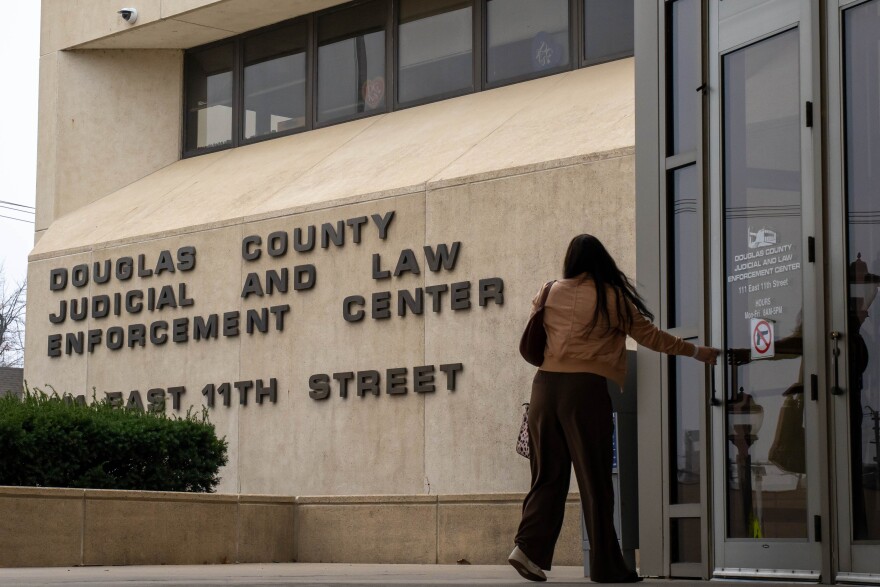LAWRENCE, Kansas — In a small Douglas County courtroom on Wednesday, a woman wearing a black blazer and a colorful bead bracelet took the witness stand.
She introduced herself as Lisa Loe, a pseudonym meant to protect the privacy of her and her transgender daughter, Lily.
Loe kept an even keel as she described the early signs that Lily’s gender did not match the sex doctors assigned her at birth. But when her attorney asked her to describe how a recent state ban on Lily’s hormone treatments had affected the family, Loe’s voice started to choke.
“My kids are so brave,” she said. “(But) I really worry for Lily’s safety.”
Loe said she now has to travel over seven hours to another state for treatments that used to be available 30 minutes away. She’s one of two parents suing the state of Kansas to reverse the ban approved by lawmakers in February.
Wednesday was the first day of hearings in their challenge to SB 63, which bans puberty blockers, hormone therapies and other treatments for young Kansans with gender dysphoria.
Medical providers could face legal liability and lose their license if they approve such treatments. Patients are prohibited from using state-funded programs, including Medicaid, to access them.
The ban has been a priority for conservative lawmakers for years. After expanding their supermajorities in the state House and Senate in the 2024 elections, Republicans this year had enough support to override a veto by Democratic Gov. Laura Kelly and pass the ban into law.
The families, represented by the American Civil Liberties Union, the ACLU of Kansas and the law firm Ballard Spahr, want a Douglas County District Court judge to issue a temporary injunction on the ban.
That would mean Kansans under the age of 18 could resume gender affirming treatments in-state, rather than ending them completely in January as the new law requires.

The arguments
Harper Seldin, an ACLU attorney, said in an interview that gender affirming treatments for minors are safe, effective and necessary. He said the ban violates Kansans’ rights to bodily autonomy and equal protection under the law.
“It violates equal protection because it treats people differently based on their sex, and it treats people differently because they're transgender,” he said. “That violates equal protection under the Kansas Constitution.”
In June, the U.S. Supreme Court upheld a law in Tennessee that also bans gender affirming care for minors. Writing for the majority, Chief Justice John Roberts said the ban did not represent unconstitutional discrimination, but rather a state’s rightful power to regulate medical care.
“(Tennessee’s law) does not exclude any individual from medical treatments on the basis of transgender status but rather removes one set of diagnoses — gender dysphoria, gender identity disorder, and gender incongruence — from the range of treatable conditions,” Roberts wrote.
Seldin said the Kansas law is different from Tennessee’s because it also prohibits public employees from advocating for social transitioning, which the law says includes changing one’s pronouns or dress.
Plus, Seldin said, “the Kansas Constitution provides separate and different rights above and beyond, and different from, the US Constitution.”
Republican Kansas Attorney General Kris Kobach, who is representing the state in the case, said that argument doesn’t hold up.
The plaintiffs are “asking the Douglas County Court to invent unwritten rights in the Kansas Constitution,” Kobach said in an interview.

LGBTQ+ rights in Kansas
Advocates for transgender and LGBTQ+ youth say the law in question is one of many legislative attacks on vulnerable Kansans.
In 2023, Kansas lawmakers passed what they called a "women's bill of rights” banning transgender women from using restrooms, locker rooms and other facilities matching their gender identity.
And for two years, transgender Kansans were unable to switch the gender marker on their driver’s licenses. That changed in October after Kobach lost a lengthy court battle.
But the culture war persists in education. Kobach encouraged an investigation into four Kansas school districts’ policies regarding gender nonconforming students.
The Department of Education has threatened to withhold federal funding from the schools if they are found to have violated student privacy and discrimination laws — though the schools say they have not received any formal complaints about their policies.
Those are the kinds of laws that Loe said make it increasingly difficult to raise a transgender daughter in Kansas.
“I love living here. I love raising my children here,” she said. But she has not yet decided whether or not she will stay in the state given her child’s medical needs.
Even as she watched Lily pick up dolls and makeup instead of stereotypical toys for boys, and even as Lily asked her repeatedly when she would “be a girl,” Loe said her faith led her to rebuke her daughter at first.
She remembered telling Lily, “God made you a boy. And God doesn’t make mistakes.”
But she said one day, her daughter asked, “When I get to heaven, is that when I’ll be a girl?”
That’s when she decided to seek psychological and medical treatment for her daughter’s gender dysphoria. Despite her initial hesitation, she said there’s no longer any doubt in her mind about that decision.
“Nobody knows their children like their mother does,” she said.
Zane Irwin reports on politics, campaigns and elections for the Kansas News Service. You can email him at zaneirwin@kcur.org.
The Kansas News Service is a collaboration of KCUR, Kansas Public Radio, KMUW and High Plains Public Radio focused on health, the social determinants of health and their connection to public policy.
Kansas News Service stories and photos may be republished by news media at no cost with proper attribution and a link to ksnewsservice.org.








